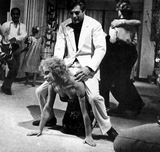La dolce vita
Special Events 2003 / La dolce vita / Italy, France 1960
The film La dolce vita not only signified a fundamental landmark in the work of Federico Fellini but, even during its first screening, and despite sharp criticism from the Vatican, it was hailed as one of the flagships of the new creative principles forged in world cinematography during the Sixties. The rich fresco of images and plot episodes tells the story of a journalist – an intellectual vainly seeking his own identity in a decadent, consumer society.

Synopsis
The film La dolce vita not only signified a fundamental landmark in the work of Federico Fellini but, even during its first screening, and despite sharp criticism from the Vatican, it was hailed as one of the flagships of the new creative principles forged in world cinematography during the sixties. Here, Fellini completely abandoned the general framework of the compact drama so typical for the great works of Italian Neorealism. Instead, he used his great invention to create a rich fresco of freely associated stories and episodes, with the eternal city of Rome as a backdrop. The hero of the film is Fellini’s alter ego – the journalist Marcello, played masterfully by Marcello Mastroianni. The intellectual vainly seeks his own identity in the decadent, consumer society of his sensationalist profession. He embarks upon a journey of no return since an observer of people without humanity gradually becomes one of them. La dolce vita won the Grand Prix at the Cannes IFF in 1960 and countless other awards and tributes.
About the film
167 min / Black & white, 35 mm
Director Federico Fellini
/ Screenplay Federico Fellini, Ennio Flaiano, Tullio Pinelli, Brunello Rondi
/ Dir. of Photography Otello Martelli
/ Music Nino Rota
/ Editor Leo Cattozzo
/ Producer Giuseppe Amato, Franco Magli, Angelo Rizzoli
/ Production Riama film, Gray Film, Pathé Cinema
/ Cast Marcello Mastroianni, Anita Ekberg, Anouk Aimée, Lex Barker, Yvonne Forneaux, Alain Cuny, Annibale Ninchi
/ Contact Asociace českých filmových klubů, Intramovies
About the director

Federico Fellini (1920, Rimini – 1993, Rome) left for Rome where he first made a living as a cartoonist. He stepped out on his path to film in 1940 as a gagman and then soon became a screenwriter and assistant to Roberto Rossellini, one of the fathers of Italian Neorealism. In 1950 he joined Alberto Lattuada to direct Variety Lights and soon debuted with The White Sheik (1952). La strada (1954), awarded at the Venice IFF, launched his career as a director who would become one of the greatest masters of the silver screen. His oeuvre includes The Nights of Cabiria (1956), La Dolce Vita (1960), 8 ½ (1962), Juliet of the Spirits (1965), Fellini Satyricon (1969), Roma (1972), Amarcord (1973), Orchestral Rehearsal (1978), And the Ship Sails On (1983), Ginger and Fred (1985), among others.
Contacts
Asociace českých filmových klubů
Stonky 860, 686 01, Uherské Hradiště
Czech Republic
Phone: +420 572 501 989
E-mail: info@acfk.cz
Intramovies
Via Eustachio Manfredi 15, 00197, Rome
Italy
Phone: +39 064 577 7930
E-mail: mail@intramovies.com
Guests

Ivo Andrle
Distributor










